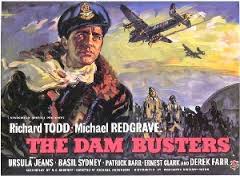
THE DAM BUSTERS
UK, 1955, 102 minutes, Black and White.
Richard Todd, Michael Redgrave, Basil Sidney, Ursula Jeans, George Baker.
Directed by Michael Anderson.
The Dam Busters was produced in the period of war tribute films in the early and mid 50's. These films are very patriotic in tone and generally give a picture of the English as stiff upper-lip heroes. The Dam Busters is no exception. It is based on similarly-written popular books of the time. The Dam Busters by Paul Brickhill and Enemy Coast Below by Guy Gibson, the leader of the expedition (played by Richard Todd). The Dam Busters is better than average for this kind of film. It gains special interest because it focuses on one operation and shows it from its inception to completion. The theoretician's and the practical man's contribution are both presented and the audience is shown quite clearly the nature and importance of the mission and how it is the thing to be accomplished.
Michael Redgrave's performance as Barnes Wallis, the engineer of the bomb to burst the Ruhr dams, is humane and gives a human dimension to the heroics of the film. Direction is by Michael Anderson who has made such films as Around the World in Eighty Days and The Shoes of the Fisherman.
1. An effective war film?
2. How strong and how valid was the sense of pride and patriotism behind it?
3. What kind of man was Barnes Wallis? How much of an idealist? How much of a scientific theoretician?
4. What is the place of men like Wallis in the war effort? Should they be encouraged or do they live in grandiose (and possibly dangerous) worlds of their own? (Devoting their complete living, thinking, breathing to the creation of bigger and more effective bombs.)
5. How forward-thinking are government and ministry officials when it comes to a new idea, a new invention? Are they too cautious?
6. Was Guy Gibson's personality developed well in this film, or was he a cardboard hero - e.g., Trigger, his dog, his efficiency and popularity with his men, his visit to the theatre, his sympathy for Wallis?
7. How well did the film show that long training and detailed preparation were necessary for missions like this?
8. Did you understand the general principles of how the bombs were to break the dam walls?
9. How effective and interesting were the scenes of the actual dam bursting and the tension of Wallis and the officials waiting for news?
10. What did you think of the damage done to these dams? Was it necessary? Why? Did it affect only the industrial side of the German war effort, or the civilians as well?